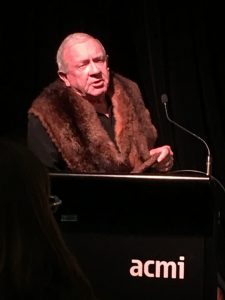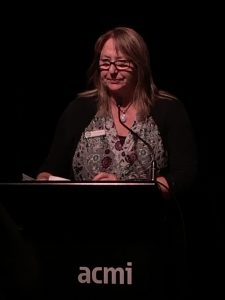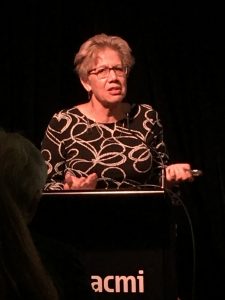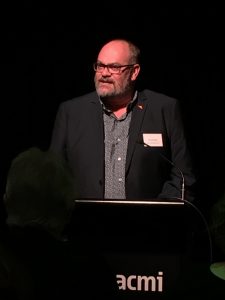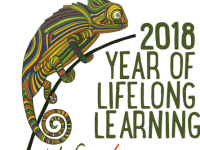Community Colleges Australia (CCA) has endorsed the push for a national Australian Lifelong Learning policy by Adult Learning Australia (ALA).
ALA held a National Lifelong Learning Summit in Melbourne on 17 April 2018 that aimed to “put lifelong learning in the centre stage” of Australian discussion to counter inequality, disadvantage, poverty, intergenerational unemployment, and widening disparities between rural and regional Australia.
“CCA strongly supports ALA’s 2018 Year of Lifelong Learning,” said Dr Don Perlgut, CEO of Community Colleges Australia, who attended the Summit along with Evelyn Goodwin, CCA’s Policy Manager. “ALA has restated the importance of renewing the ACE Ministerial Declaration, which CCA has long supported.”
The Summit was held at the ACMI, and was chaired by ALA CEO Jenny Macaffer (photo below), featuring speakers from the International Council for Adult Education, St Vincent de Paul Society, Australian Council of Social Service, Community Council for Australia, Australian Local Government Association and Australian Neighbourhood Houses Association.
“The event was a rich and useful summit exploring what is needed to create both a culture and a policy framework for lifelong learning in Australia, facilitating key inputs from a broad range of users,” said Evelyn Goodwin, CCA Policy Manager. Richard Vinycomb, Director of CCA member Byron Community College and a Board Director of Adult Learning Australia, also attended the Summit, which attracted a broad range of adult and community education organisations and supporters.
The Messages
Key conclusions and “take away” messages included:
- A whole of system approach is required, with increased coordination between local, state and national systems. No single actor will have the answers.
- Key influencers can work together in building a society that embraces lifelong learning.
- Creative, innovative entrepreneurial approaches are needed.
- Promotion and marketing of narratives and conversation can gain traction and create change. It is crucial the sectors engage in effective marketing outside of government channels to engender a learning culture.
- Messages matter: people don’t talk about “lifelong learning” in everyday conversation. Simpler mechanisms and promotions are needed to build engagement and a groundswell interested in ongoing learning. For example, asking ‘what did you learn today’ every day to everyone shifts thinking and builds expectation.
- There is a continuing bias towards work-relevant learning and skills; working with this narrative will gain government engagement and support.
The Speakers
Wurundjeri Aboriginal elder Ron Jones (pictured below) provided a stirring Welcome to Country.
Sandy Morrison, President, International Council of Adult Education & Associate Professor, University of Waikato (pictured below) gave the Summit keynote address. The New Zealand-based academic provided a reflective overview of the journey of adult education in Asia and the Pacific, contrasting the framework of New Zealand with that of Australia, noting the lack of structure surrounding adult learning. In relation to the support of Indigenous learning engagement and support, she reported that Maoris make up about 15% of New Zealand’s population and speak the same language, whereas in Australia the Indigenous peoples are about 3% with hundreds of languages, so it is a very different social, political and cultural context.
Tony Driese (pictured below), an independent consultant and Indigenous scholar at Australian National University, gave an insightful and entertaining overview of the current state of neglect and of adult learning on the national level, identifying lifelong learning as the “mortar” that holds the bricks of society in place.
Michael Taylor, National Policy and Projects Manager for Australian Industry Group (AIG) supported a work outcomes basis for adult learning policy. He reinforced the current lack of effective policy and programs across VET and LLN more broadly under the current Commonwealth system, even those with active employer support and a clear evidence base, noting particularly the demise of the WELL program – a joint government-industry program with real results focussing on the workplace. He sees developing and recording successful program outcomes – developed and carried out with industry and work-based partners – as the key to successful policy.
Dr Gwilym Croucher, Senior Lecturer in the Melbourne Centre for the Study of Higher Education, also proposed work-oriented ongoing learning and suggested the formation of an independent national body to oversee adult learning policy and implementation set up with bipartisan support.
Dr John Falzon, Chief Executive of the St Vincent Paul Society, criticised the current political context, claiming that it actively targets the disadvantaged. Both sides of politics have systematically undermined and run down TAFE.
David Crosbie, CEO of Community Council for Australia, renounced the value of policy statements, claiming they had little relevance to or leverage with the decisions made within government. The disadvantaged will remain unheard in “business as usual” scenarios. He gave an example of how his work with disadvantaged youth was enhanced by proper reporting of outcomes.
Chris McCall, ALA President and Nicole Battle, CEO of Neighbourhood Houses Victoria reinforced the importance of place-based programs, particularly with the disadvantaged, migrants and elders engage the community and provide critical support and social cohesion.
Councillor Mary Lalios, Board Member of the Australian Local Government Association and former Mayor of City of Whittlesea, reported that local councils can and do support lifelong learning strategies; persistence and lobbying can pay off and have powerful community outcomes.
Sue McKerracher, CEO of the Australian Library and Information Association, used the Trojan horse metaphor – to get what you need you need to use other mechanisms to persuade those in power. Her association has deliberately based itself in Canberra in order to facilitated direct access Commonwealth Government decision makers.
Bruce Mackenzie, a “VET elder” and Chief Executive of Holmesglen Institute for 31 years, gave an engaging historical overview that placed lifelong learning in context. He reported that the funding and development of TAFE’s focus on industry and VET’s focus on training packages has moved the model away from community and individual learning to learning for work. He cautioned that the current environment had to be considered in any attempts to re-focus national policy to embody adult learning principles.
Photos below
